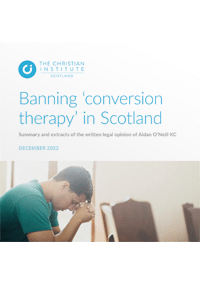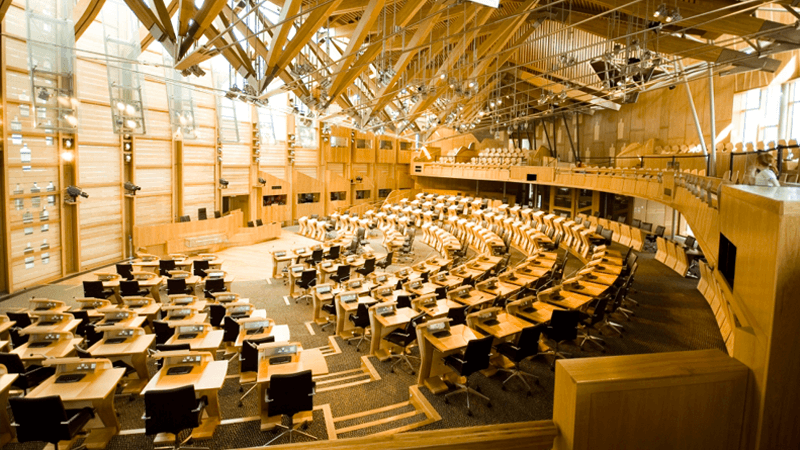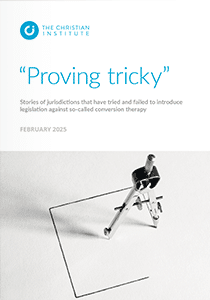The Scottish Government has announced it will launch its public consultation on legislation to ban so-called conversion therapy on 9 January.
Its wording has been informed by reports and recommendations made by the Scottish Parliament’s Equalities, Human Rights and Civil Justice Committee and an ‘Expert Advisory Group on Ending Conversion Practices’ appointed by the Scottish Government.
Both groups called on the Government to model its legislation on the conversion therapy law currently in force in Victoria, Australia – a recommendation human rights expert Aidan O’Neill KC says “would have the undoubted effect of criminalising much mainstream pastoral work of churches”.
Church leaders’ letter
The Scottish Government wants to outlaw ‘practices’ that seek to change, suppress or inhibit someone’s sexual orientation or gender identity. Activists are campaigning for this to cover “casual conversations”, “gentle, non-coercive prayer”. They even say children should be able to change gender without their parents’ consent.
The announcement of the consultation comes just days after church leaders from different denominations wrote to the Scottish Government urging it to drop plans for a Bill banning so-called conversion therapy.
More than 1,800 others have already signed the letter, including over 500 church leaders and pastoral workers.
Summary and extracts of the written legal opinion of Aidan O’Neill KC
The Christian Institute commissioned written legal advice from Aidan O’Neill KC in December 2022. This booklet offers a summary and extracts of the legal opinion received.
Silencing legitimate support
In the letter to Holyrood’s Equalities Minister Emma Roddick, co-signatory and Christian Institute trustee Revd Dr William Philip said the planned Bill “would see parents and churches in the firing line simply for daring to disagree with LGBT orthodoxy.
“The LGBT activists behind this Bill want to target not abuse and coercion – which are already illegal – but ‘private prayer’ and ‘casual conversations’ if the content does not affirm their ideology.”
Revd Stephen Allison of Kiltarlity Free Church of Scotland added: “It is our responsibility as ministers to help our congregations live for Christ in all areas of life.
“The proposed legislation threatens to silence the legitimate prayerful and pastoral support that we can give to those questioning sexual ethics and gender. It also threatens parents’ ability to have loving conversations with their children about sexuality and gender.”
Public opinion
Polling in September revealed the Scottish public has little appetite for banning conversion therapy, with just five per cent of Scottish adults regarding the controversial legislation as a priority, ranking it least important of 16 possible options. It was also only a priority for five per cent of those who voted SNP at the last election.
Simon Calvert, the Institute’s Deputy Director (Public Affairs) observed: “Despite years of campaigning by activists, the public are not at all convinced of the need for an expansive conversion therapy ban. The fact is that gay and trans people are rightly already fully protected against verbal and physical abuse, so there is simply no need for a new law.”
He added: “The kind of ban being called for would be a radical and unwelcome new departure in Scottish law, allowing bureaucrats to tell Christians exactly how to pray. It would effectively make ‘misgendering’ an offence. And it would criminalise parents who try to prevent their children being prescribed puberty blockers.”
Westminster
At Westminster, the Government has said its draft Bill is unlikely to be published until spring, but two Private Members’ Bills have already been tabled.
In the House of Commons, Labour backbencher Lloyd Russell-Moyle has proposed a law which would “prohibit practices whose predetermined purpose is to change a person’s sexual orientation or to change a person to or from being transgender; and for connected purposes”.
And in the House of Lords, Liberal Democrat Peer Baroness Burt of Solihull is seeking to impose unlimited fines for those deemed to offer “any practice” that assumes “any sexual orientation or gender identity is inherently preferable to another” and intends to “change” or “suppress” either.
Private Members’ Bills rarely become law but they could be used to influence the Government’s own draft. The Bills are expected to be debated in their respective Houses early next year.




